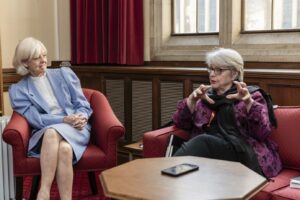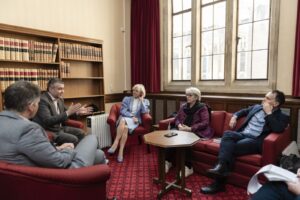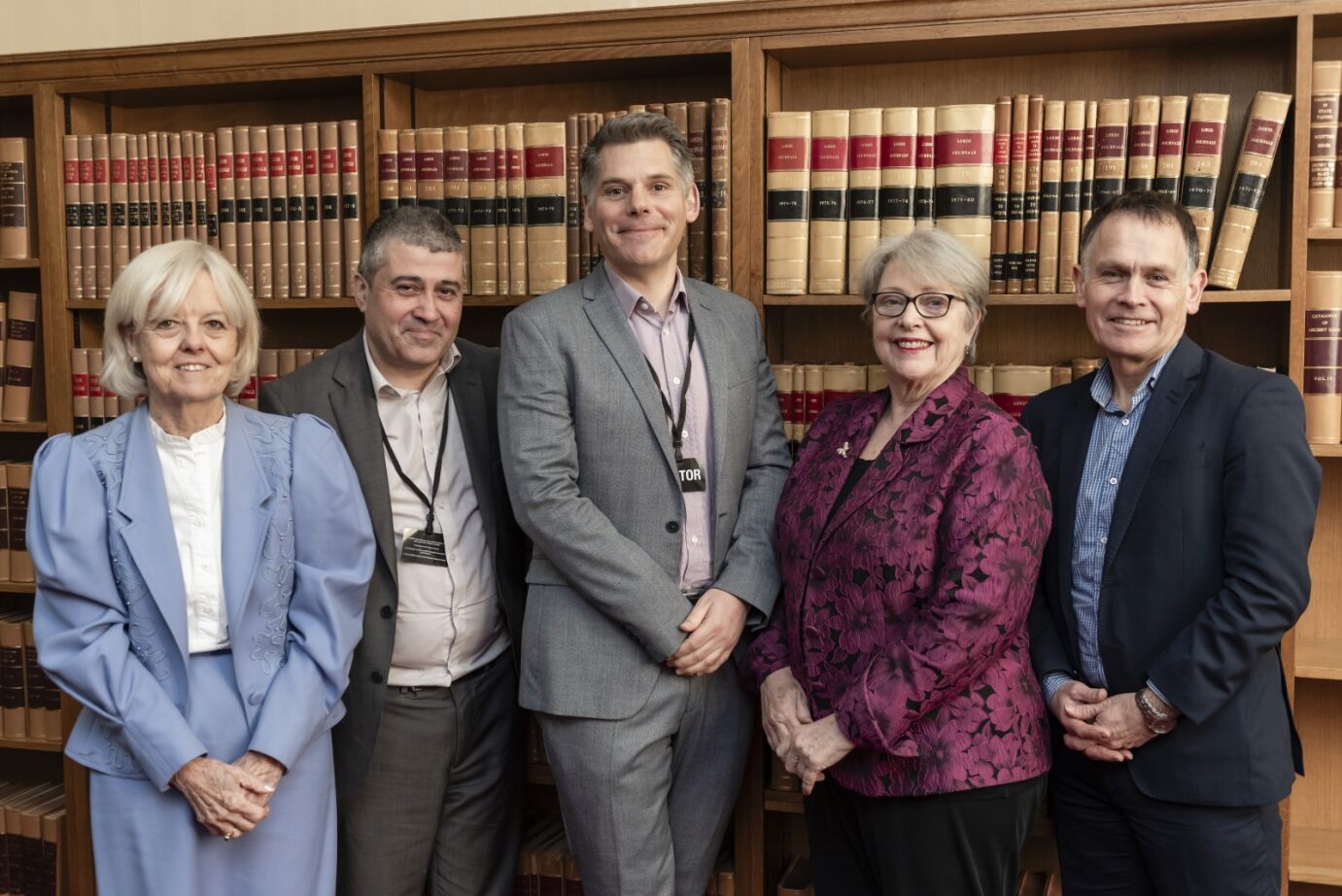Views from the Top
Five Fabian general secretaries, past and present, discuss John Smith, splits, and the weight of history in conversation with Kate Murray
What do you call a collection of Fabian Society general secretaries? According to the general secretaries past and present that the Fabian Review brought together for a chat to mark the society’s 140th anniversary, the correct collective noun should be ‘a tract’.
So, with as many members of the ‘tract’ as we could gather, we discussed the highs and lows of the last few decades of Fabian history – and the contribution Fabianism continues to make to the Labour movement. In the room were Baroness Dianne Hayter, who led the society from 1976 to 1982 (and later became chair in 1992), Baroness Glenys Thornton, who served as interim general secretary from 1993 to 1994, Michael Jacobs (1997–2003), Sunder Katwala (2003–11) and current general secretary Andrew Harrop, who took over in 2011.
Which moments stand out?
Glenys Thornton: When John Smith died. The whole building was traumatised and in tears – some of us had been at the event the night before when he made that really wonderful speech about being given the opportunity to serve. We had a huge conference called ‘Whatever Next?’ already planned, which then suddenly became a rather important conference because we had a leadership election in the Labour party.

Dianne Hayter: A standout one for me, actually from when I was chair, is also a John Smith moment. The Fabians have a self-denying ordinance – we don’t have a policy [position] and so it was always really drummed into me that we never voted at party conference on anything. And then there was the really important vote on one member one vote. Everyone had been chasing me around – it was that close. I was told the boss wanted to see me, so I went in to see John and he said – well, no matter what he said, because I don’t think it’s known. So I left and I voted. I think it was the right thing to do.
But [when I was general secretary], it was what we were doing internationally. I remember [Felipe] Gonzales after the attempted takeover in the Spanish parliament coming in for a sandwich lunch with our executive. I remember meeting Kenneth Kaunda when he was over. I was very young when I went to the Fabians, so suddenly meeting all these extraordinary people was quite something for me. It was only when I went to the Fabians that I met people whose names were down the spines of books.
Sunder Katwala: I was 2003–2011 and the context was renewal – deepening in office but also transition. And of course it was a time of factionalism within New Labour. By the time of a leadership contest [in 2007], we ended up organising a leadership debate for a contest that only had one candidate in it. Gordon Brown actually debated Michael Meacher and John McDonnell and they didn’t [make it onto] the ballot. I got a phone call from Ed Balls; he said: “Gordon’s very clear he’s very open to challenge” but someone in the machine was making sure there were no nominations. It was an extraordinary occasion.
Andrew Harrop: The flipside of that [the New Labour years] is my time taking the Fabians through a very long period of opposition. The reason I’ve been happy doing the job for so long is that each parliament has been very different.
I think one of my most memorable moments was the [Fabian] hustings after the 2015 election, which was the first that Jeremy Corbyn attended, having just announced that he was going to stand. Corbyn turned up late and dressed in the way that he always was. It was a Fabian audience – and he set the room alight. He basically just tapped into that moment of complete disillusion after having lost. The rest of the debate was very conventional – people of the New Labour era debating with each other. He was able to stand out and bring people who were mainstream party members over to him.
Michael Jacobs: The standout in my period was the commission on taxation and citizenship. Its headline recommendation was a hypothecated tax for the National Health Service. The argument was that if you looked at public opinion, people were willing to pay more taxes but only if they felt it was going to the things that they really wanted it spent on. It seemed to us that reconnecting citizens to taxes would be helped by having a tax which was explicitly tied to the thing that they cared most about, which was health, and where the need for more money was most obvious. Gordon Brown didn’t do a hypothecated health tax but, in his next budget, he did raise national insurance and earmarked it for the National Health Service. It was possibly the most popular budget that there has been in the history of measuring the popularity of budgets.
An existential crisis: the formation of the SDP
DH: We lost our vice-chair, who was Shirley Williams, our treasurer John Roper, John Cartwright and David Sainsbury. It was a big chunk of the executive. What they tried to say was that they were socialists, and that therefore they should remain as members of the Fabian Society. Our rules were that you couldn’t be an officer of the Fabian Society unless you were eligible to be in the Labour party – but it didn’t say that about the membership. So they said they could stay as members and we had this awful thing then at the AGM in November 1981 to throw them out.
SK: But by my time we were doing an awful lot of ‘Lib-Labbery’ because there was basically a sense of a shared intellectual tradition.
DH: We were very tribal.
GT: We had to work very hard at local level to keep Labour party members in the Labour party and not to join the SDP. We were actually on the phones non-stop during those weeks to keep comrades in the Labour party – it was hand-to-hand combat.
Supporting and challenging the Labour party

MJ: The big deal in 1997 was: what was our stance going to be towards government? The Fabian committee at that time was what we would now call fairly Blairite. But Margaret [Hodge, then the chair of the society] was absolutely insistent we should not just be cheerleaders for the government, and that we should be a critical friend. I don’t know whether this phrase ‘critical friend’ had prior history, but it became our watchword, and I wrote a piece in the New Statesman when I first came in which I talked about ‘deep’ Blairism and ‘shallow’ Blairism, trying to say that the Blair project could be a more conservative, narrowly conceived thing or it could be a deeper, wider project. For me, it was always about trying to expand the boundaries. It seemed to me that the government didn’t need cheerleaders. It did its own cheerleading for what it wanted to do. It needed people who were willing to push the boundaries.
SK: [In my time] you had a different politics of identity that was emerging… we very much got hold of those identity debates. Sadiq Khan got very involved in the Fabian Society, [as did] John Denham – I had those two trying to think about a bridging agenda around identity, integration and Britishness. Those things are absolutely front and centre now, but what’s interesting is just how little diversity there actually was in New Labour as a project in the higher echelons.
AH: Through those Corbyn years we felt we had a really important role in terms of holding the party together. We tried to be a place for safe and respectful debate. We did see it as important that we were hosting debate across the breadth of the party. We were sort of a lifeboat for some members – including some who had resigned from the party and others who were still in the party but just hunkered down.
Leading the Fabian Society: a historic responsibility?
SK: Some people join the Fabians because of the history. But it was important, I thought, not to make it a historical society, but to [cast] what the Fabians have been doing at [each] particular moment, whether it’s creating the Labour party, or clause four in 1918, as actually trying to be at the forward edge of their times. It’s a history of radicalism and change.
GT: From 1992 to 1997, the Fabians played a very important role in in helping to develop what became the New Labour project. Partly it was the Southern Discomfort research [looking at the reasons for the 1992 defeat] and partly it was because it gave a platform to the people who ultimately became the New Labour founders and actors. After John Smith had led the one member one vote reform in the Labour party, his and others’ views were that the modernisation project had ended. I have to say that quite a few people disagreed with that. The Fabians were important not because we took a position on that, but because we provided the platforms necessary for the modernisation project to go forward. Then when John died that kind of precipitated us into helping to heal the Labour party, which was absolutely grieving.
And the future?
AH: You do have a sense of history with the Fabians, but our membership also includes lots of young people, people from very, very diverse backgrounds. Some of them come to us because they’ve heard that history even at school, but a lot of them have never heard of the Fabians and come because of word of mouth – someone tells them about the FWN mentoring programme or Young Fabians. So there is still that role of developing people’s political life as well as our Westminster-facing role in providing ideas for the party leader.
MJ: In my experience, the Fabian membership is a pretty good microcosm of the party as a whole. I used to say that Tony Blair and Peter Mandelson not only invented new Labour – they invented Old Labour. They characterised everybody who wasn’t New Labour as Old Labour – and that was Roy Hattersley and Tony Benn. It was everybody who was a traditional Labour party person, right and left, and they were the new guys. I discovered that Fabian members were Old Labour. A lot of them were Hattersley-ites; they were very social democratic, but they were a bit suspicious of the shiny newness of New Labour. I suspect it’s still true that a lot of Fabian members are solid, middle of the road Labour people who are uncomfortable at the thought that a Starmer government just won’t be strong and radical enough to deal with the problems we have to deal with. The Fabian Society now, assuming Labour comes into government, can ask the leadership to be more radical than it currently looks, with the backing of its members and with the backing of the majority of Labour party members.
GT: A Labour government needs new ideas – and where are they going to come from if they’re not coming from us?

